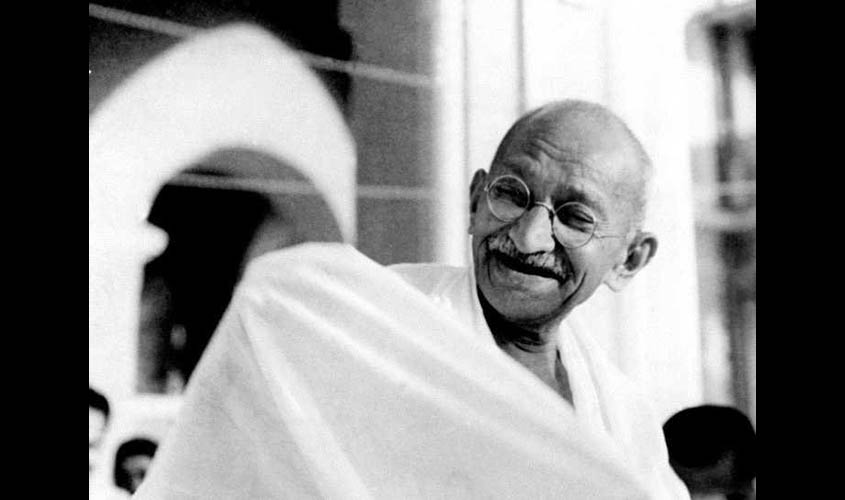He was a guru, saint, visionary, apostle of non-violence and a peace loving revolutionary, ascetic politician.
On 2 October, India and the world will celebrate the 150th anniversary of Mahatma Gandhi’s birth. He was born in Porbandar on 2.10.1869. It was an extraordinary decade. Rabindranath Tagore was born in 1861, so also Pandit Madan Mohan Malviya, Swami Vivekananda in 1862, Gopal Krishna Gokhale in 1863. In 1869 was built the Suez Canal by the French engineer Ferdinand de Lesseps.
More than 10,000 books have been written on the life and philosophy of the Mahatma. His selected works run into 100 volumes. For no other individual in history have so many books been written in so many languages. His statues have been erected in Asia, US, Canada, Mexico, Argentina, Chile, Brazil, Trinidad and Tobago, Ghana, South Africa and many other countries. Lenin, Churchill, Roosevelt have almost been forgotten outside their countries. Not Gandhi.
On Gandhiji’s 70th birthday, Albert Einstein wrote: “A leader of his people, unsupported by any outward authority; a politician whose success rests not upon craft nor the mastery of technical devices, but simply on the convincing power of his personality; a victorious fighter who has always scorned the use of force; a man of wisdom and humility, armed with resolve and inflexible consistency, who has devoted all his strength to the uplifting of his people and the betterment of their lot; a man who has confronted the brutality of Europe with the dignity of the simple human being, and thus at all times risen superior.
“Generations to come, it may be, will scarce believe that such a one as this ever in flesh and blood walked upon this earth.”
When asked what legacy he would leave, Gandhiji’s answer was: “My life is my message.” Gandhi belongs to the world. He was a guru, saint, visionary, apostle of non-violence and a peace loving revolutionary, ascetic politician whom hundreds of millions followed, respected and revered. He was editor, journalist an original thinker. A demanding disciplinarian, guided by his inner voice. He took the vow of celibacy while in South Africa after the birth of his four sons.
Apart from his autobiography, The Story of My Experiments with Truth, Hind Swaraj is his most famous book. It was written in 1909 on his return voyage from England to South Africa. It was written in Gujarati. He then translated into English. The book is a severe condemnation of western civilisation.
The book is a dialogue between a reader and the editor (Gandhi). Reader: “You have denounced railways, lawyers, doctors. I can see you will discard all machinery. What then is civilisation?” Editor: “The answer to that question is not difficult. I believe that the civilisation of India has evolved is not to be beaten in the world. Nothing can equal the seeds sown by our ancestors. Rome went. Greece shared the same fate, the might of the Pharaos was broken. Japan has become westernised, of China nothing can be said, but India is still, somehow or other, sound at the foundation. The people of Europe learn lessons from the writings of the men of Greece and Rome, which exist no longer in their former glory. In trying to learn from them, the Europeans imagine that they will avoid the mistakes of Greece and Rome. Such is their pitiable condition. In the midst of all this India remains immovable and that is her glory. It is a charge against India that her people are so uncivilised, ignorant and stolid, that it is not possible to induce them to adopt changes. It is really a charge against our merit. What we have tested and found true on the anvil of experience, we dare not change…”
Thirty-five years later Gandhiji and Jawaharlal Nehru exchanged letters on the merits and demerits of Hind Swaraj.
On 5 October 1945, Gandhiji wrote to Jawaharlal Nehru about “the different outlook between us… I am convinced that if India is to attain true freedom and through India the world also, then sooner or later the fact must be recognised that people will have to live in villages, not in towns, in huts, not in palaces… I want to live to 125 for the service of India but I must admit that I am now an old man. You are much younger in comparison and I have therefore named you as my heir. I must, however, understand my heir and my heir should understand me. Then alone shall I be content.
“If you feel you should meet me to talk over what I have written, we must arrange a meeting. You are working hard. I hope you are well. I trust Indu too is fit.
“Blessings from
“Bapu”
Jawaharlal Nehru replied on 9 October, from Anand Bhawan, Allahabad.
“My dear Bapu,
“I do not understand why a village should necessarily embody truth and non-violence. A village, normally speaking, is backward intellectually and culturally and no progress can be made from a backward environment. Narrow-minded people are much more likely to be untruthful and violent…
“It is many years ago since I read Hind Swaraj and have only a vague picture in my mind. But even when I read it 20 or more years ago it seemed to me completely unreal…
“Yours affectionately
“Jawaharlal”

